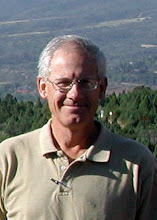It is beyond my comprehension how anyone in this field of root cause analysis cannot wonder about the most fundamental questions of life. We all know that the incidents we investigate have causes, that is, there are reasons why things go wrong. In other words, none of us have ever investigated anything without coming to the conclusion that the things that go wrong in our lives happen for a reason.
Recently, my personal thoughts have taken me to the subject of “the wilderness.” I suppose that all of life is a step into the wilderness. We either make large, intentional steps into the unknown by embarking on huge new ventures, or we simply get out of bed in the morning for another new day.
Whatever our present circumstances in life, we’re all the same when it comes to our journeys. Whether we like it or not, we’re all stepping into the unknown.

Whatever our present circumstances in life, we’re all the same when it comes to our journeys. Whether we like it or not, we’re all stepping into the unknown.

Imagine, for a moment, that you are literally in a wilderness setting. Let’s say you have slept in a tent, and have gotten up in the morning to embark on a 5 mile hike to a glacier in Alaska. You are with a friend, because it’s dangerous to go into the wilderness on your own. You have firearms, in case you encounter dangerous wildlife but you are out of range of any cell phone towers.
Although the above scenario is a specific one, all of life is like this in one form or another. The “tent” is our beds that we sleep in overnight. The 5 mile hike is our plan for the day. The friend is “the people around us,” and the “firearms” are whatever we have chosen to take along with us to keep us safe.
But what would you make of it if you were were hiking to the glacier and you suddenly felt a severe pain in your chest, or if you turned your ankle on a rock, or if a boulder suddenly came rolling down a hill and destroyed all of your gear?
What do you make of it when you set out on your journey and significant things go wrong along the way? Do you say to yourself “I probably should not have gone on this journey in the first place,” or “I was not sufficiently prepared -- I’ll be more prepared next time?”
Or is something much more profound going on when we encounter unexpected, unplanned pain along our life’s journey’s?
As for myself, I have concluded that there is something much more profound going on -- and I think I’ve discovered what it is. And yet, I have learned not to share my personal conclusions with too many people. My understandings are mine. Your understandings are yours. I cannot force my understandings on you, nor would I want to. In this respect, those of you who have taken the 4-day Latent Cause Experience class know my position on these things: the people who have experienced pain while embarking on their wilderness journeys need to come to their own conclusions.

But I would like to share the following quote byMalcolm Muggeridge (1903-1990). When I first read it, I dismissed it as lunacy. But the older I get, the more wisdom I see in it. Think about it. Dwell in it. It might help you change the way you see things.
Looking back on life, it’s one of the things that strike you most forcibly – that the only thing that’s taught one anything is suffering, pain and failure. Not success, not happiness, not anything like that. The only thing that really teaches what life is about – the joy of understanding, the joy of coming in contact with what life really signifies – is suffering, affliction.
The unexpected pain that comes along in all of our lives seems to eventually drive us away from the world around us and deeper into ourselves, into an either conscious or subconscious quest that looks for answers nowhere else to be found. Isn’t that, in itself fascinating? Not to be morbid, but I wonder what was going on in the minds (or souls) of my mother or father as they laid on their death beds? Never having been there, I don’t know. But I have experienced debilitating setbacks in my life, both physical and emotional, and I know where my mind went.
Your pain is the breaking of the shell that encloses your understanding. (Kahlil Gibran)
As we walk along the wilderness journeys of our lives, we will experience unexpected and unplanned pain. Pain is the only phenomena of life capable of getting our attention when we are too wrapped up in our own self-created agendas. When it comes, it is trying to tell us something profound.
Those of us dealing with Latent Cause or Root Cause Analysis are dealing with one of the most potentially impactful exercises of life.
Don’t squander it!
Learn More About Latent Cause Analysis
If you are keen to step out of the wilderness, we have built a checklist for you. The following path has been developed to help individuals like you to get up to speed in becoming a champion, a fighter and a game changer.
- Join Failsafe Network's mailing list that's on the footer of our website
- Listen to an introductory, free 15-minute webcast on What is Root Cause Analysis
- Perform a mini-latent cause analysis on any real home or work problem
- Download our eBook for an inspiring read
- Attend The Latent Cause Experience Training as a guest

